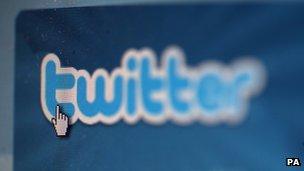Twitter to selectively 'censor' tweets by country
-
Published
-
comments

Twitter has announced that it now has the technology to selectively block tweets on a country by country basis.
In its blog, Twitter said it could "reactively withhold content from users in a specific country".
But it said the removed content would be available to the rest of the world. Previously when Twitter deleted a tweet, it would disappear worldwide.
The decision has been criticised by the freedom of information advocacy group Reporters Without Borders.
The move comes at a time when Twitter is in the process of expanding its global business.
In its blog post, Twitter explained that its international growth meant entering countries "that have different ideas about the contours of freedom of expression", citing France or Germany which ban pro-Nazi content as examples.
"Starting today, we give ourselves the ability to reactively withhold content from users in a specific country - while keeping it available in the rest of the world," the company said in a blog post titled Tweets Must Flow.
"We haven't yet used this ability, but if and when we are required to withhold a tweet in a specific country, we will attempt to let the user know, and we will clearly mark when the content has been withheld," it added.
A number of Twitter users have expressed dismay over the move, with some pointing out the adverse impact it would have on free speech, especially outside the US.
'Compromised'
Reporters Without Borders said it had concerns about the new measures.
"In the bigger scheme of things it just opens up the floodgates," spokeswoman Heather Blake told the BBC.
"It allows for Twitter or other internet organisations to censor things. Freedom of information, and freedom of the press can be compromised.
"It would be interesting to ask them what research they have done to show this will help in any way by censoring tweets within countries. Is it problematic, or are they getting pressured by certain organisations or certain regimes within the countries in order to continue to function there?"
In response to the criticism, the microblogging site said: "In general this would be a response to a valid legal request from a government. Our policies and our philosophy towards recognising freedom of expression has not changed - this is simply a clarification to how we respond to legal requirements."
Twitter, along with other social networking sites like Facebook, has played a vital - if disputed - role in organising everything from the Arab Spring to the London riots in 2011, according to the BBC's technology correspondent Rory Cellan-Jones.
However, the service - which said it had more than 100 million active users as of September 2011 - has also had to balance local laws with free speech in the process.
The blog statement acknowledged that Twitter would not be able to operate in all countries, saying: "Some differ so much from our ideas that we will not be able to exist there."
Twitter is blocked in China, where microblogging alternatives known as Weibo have surged in popularity in the past year.
-
-
Published8 March 2012
-
-
-
Published22 December 2011
-
-
-
Published9 September 2011
-